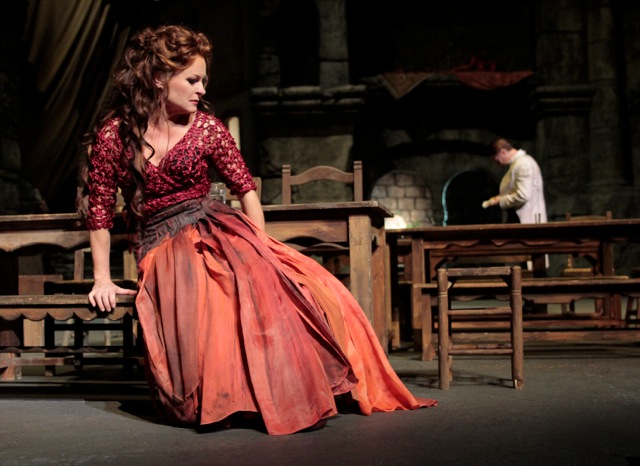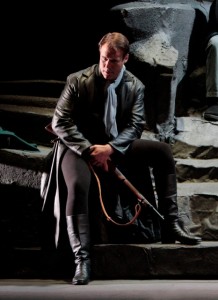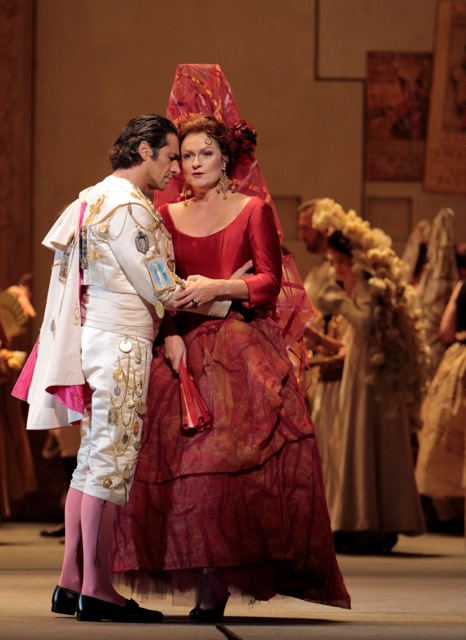Archive for September 2013
Los Angeles Opera 2013-14 Season Opens with Well-received Revival of Bizet’s Carmen
Review by David Gregson (performance of September 21)
Forever new — “at least to someone” as the saying goes — Bizet’s Carmen in LA is currently about a fatalistic Irish temptress from Dublin who seduces a handsome callow youth from Billings, Montana, but gets distracted by a sexy matador from Pescara, Italy. It all takes place in Spain, but they sing about it in non-native French, and the story doesn’t end well for anybody, including the naive young American’s stalker girlfriend from Piet Retief, South Africa, who is always pestering him about his ailing mother. That fairly well sums up my initial impression of the current Los Angeles Opera 2013-14 season opener which took place Saturday evening in the Dorothy Chandler Pavilion. For good or for ill, some members of the international cast brought a tiny bit of their own backgrounds into (pace Espagna!) a quintessentially Gallic masterpiece. To quote the baffled query of one audience member I overheard in the lobby, “Is this a French opera?”
The Carmen is Patricia Bardon and the Don José is Brandon Jovanovich, both blessed with gorgeous voices: Bardon’s a creamy though not huge mezzo-soprano, and Jovanovich’s a strong secure tenor with a remarkable evenness from one end of the spectrum to the other. Both artists are enormously pleasing to look at, so it’s a shame that no genuine sparks ignite between them vocally. We only get a visual pantomime of their feelings.
In the opening scenes, Bardon superbly executes all of the requisite seductive gypsy moves in the role, although her castanets are relegated to the orchestra pit during the famous taunting dance en votre honneur of Act Two in the tavern of Lillas Pastia. That danse sans castagnettes is, for me, emblematic of what’s missing from the Bardon performance as a whole. It doesn’t go that extra mile, physically or vocally. Her thermometer keeps going down as the opera progresses. She and the stage director apparently view the character as resigned to her fate (certainly a legitimate interpretation, and the key to one of the best Carmens I ever saw performed on stage), but nothing Bardon does is pressed to the limit of her own very capable talents.
And that sort of thing goes double for Jovanovich who has no solid grasp of his character or of the appropriate style. The singing is always attractive, but never idiomatic. If his Don José is intended to seem like a clueless American college jock shifting his weight back and forth in a nervous state of insecurity, then Jovanovich succeeds brilliantly in his goal. But his only aria, the “Flower Song” (“La fleur que tu m’avais jetée”), one of the high points in French opera, though dispatched with supreme vocal confidence, was also devoid of much feeling. As fine as Jovanovich is, he cannot touch Roberto Alagna or Jonas Kaufmann in this part.
Because Bardon is so gifted vocally, it was a shame she was unable to dig into many of her arias, particularly the Act Three “Card Song.” It was well vocalized, but resignation trumped the sense of doom. In her final fatal clinch with José in front of the bullring’s exterior, the stage direction for the two performers was unfocused and clumsy — actually eliciting rude laughs from a couple in front of me. Bardon’s falls to the floor were risible, partly because her mantilla threatened to fly skyward. Such operatic scuffles can often be unconvincing, but this one was especially inadequate. Overall, the stage direction failed the two singers in terms of personal interaction.
So, much earlier on in the opera, it was up to the matador to save the day — and that he did brilliantly. Ildebrando D’Arcangelo is one of the more exciting bass-baritones on the world’s opera stages. Though physically short of stature in comparison to his colleagues, he makes a powerful impression in every department. It’s a shame that Bizet assigned Escamillo only one big number in the opera — the familiar “Toreador Song” that frames the bullfighter’s entrance — but D’Arcangelo is a charismatic presence when and wherever he appears in duets and ensembles with other cast members. (As an aside, D’Arcangelo is an almost ideal Don Giovanni, which means in today’s opera market, a good looking guy that can really sing. So one may be astonished to discover that DGG has released a complete Don Giovanni overflowing with physically attractive, golden throated opera stars — D’Arcangelo, Luca Pisaroni, Diana Damrau, Joyce DiDonato, and Rolando Villazon — but not as a video. It’s a CD set only.)
I am certain I am not the only Carmen veteran who cannot bear Don José’s nagging girlfriend, Micaëla, who haunts the action like the walking personification of Guilt. What a wife she would make that man! But, she has an aria in Act Three — a lovely though rather saccharine one it has always seemed to me — and every soprano on earth has to sing it at some point in her career. The number would be infinitely more enjoyable if it did not bring the drama’s action to a dead halt about 30 minutes before the end of three-and-a-half-hour evening. In any case, it is sung here very sweetly by the aforementioned South African, soprano Pretty Yende. A recent (2011) Operalia winner, she is an appealing artist with a promising roster of future engagements.
Carmen’s second-act quintet, doubtlessly one of the most delightful ensembles in French opera, is sung by Carmen and the smugglers Frasquita, Le Dancaïre, Mercédès, and Le Remendado (in order, Korean soprano Hae Ji Chang; Korean baritone, Museop Kim; Mexican mezzo-soprano Cassandra Zoé Velasco; and American tenor Keith Jameson), and they made the expected good impression. Lieutenant Zuniga was sung in muffled tones and incomprehensible French by Russian basso, Valentin Anikin. American baritone Daniel Armstrong was a pleasing Moralès. The chorus was, with a few scattered seconds of collapsed coordination, its usual accomplished self, in part due to its skilled chorus master, Grant Gershon.
Making their third appearance in LA, and inexplicably winning gasps of pleasure and bouts of applause from the opening night audience, were the literal and now familiar sets of Argentine designer Gerardo Trotti. The first-act streets of Seville with their plastic palm streets and pie-wedged vanishing point evoke images of a SoCal condo development. The overly color-co-ordinated salmon-and-white (peaches and cream?) costumes by Spanish designer Jesús del Pozo add to a sense of calculated artificiality. Lillas Pastia’s tavern in Act Two is an ugly overgrown cave lined with brown boulders; but the rocky pass of Act Three (where the smugglers are dwelling) is impressively utilitarian. You could safely crawl all over most of those gunnite crags. The final street scene before the bullring, complete with devotional wall scone, has the flavor of some neatly composed fantasy construction built for a shopping mall. Oddly, despite the large spaces available to the current stage director, American Trevor Ross (working from the original production concept of Spanish director Emilio Sagi), the stage pictures often look crowded. And yet, in the exciting finale when we might be seeing matadors, picadors and the local populace stirring up excitement, there comes a placid desultory filling of the void with people sporadically running about or dutifully taking their places at the sides of the stage.
After leading the assembly in the the national anthem, conductor Plácido Domingo hurled headlong into the overture at a whirlwind pace, and he did a fine job of keeping things moving throughout. The LA Opera orchestra revealed highlights and textures that were a pleasure to here. It was one of Domingo’s better jobs on the podium.
Judging by the audience response, this Carmen is a great success. Some major cast changes are in the works, however, and I have indicated them below.
CAST
Carmen: Patricia Bardon
Carmen: (Sept. 28) Milena Kitic
Don José: Brandon Jovanovich
Don José: (Oct. 1, 4) Thiago Arancam*
Micaëla: Pretty Yende*
Micaëla: (Sept. 28) Amanda Woodbury+*
Escamillo: Ildebrando D’Arcangelo
Escamillo: (Sept. 28) Dwayne Croft
Zuniga: Valentin Anikin+*
El Remendado: Keith Jameson
El Dancairo: Museop Kim++
Morales: Daniel Armstrong++
Frasquita: Hae Ji Chang+*
Mercedes: Cassandra Zoé Velasco+*
CREATIVE TEAM
Conductor (Sep. 21, 29; Oct. 1, 6): Plácido Domingo
Conductor (Sep. 26, 28; Oct. 4): Grant Gershon
Original Production: Emilio Sagi
Director: Trevore Ross*
Scenery Designer: Gerardo Trotti
Costume Designer: Jesus del Pozo
Lighting Designer: Guido Levi
Choreographer: Nuria Castejón
Associate Choreographer: Briseyda Zárate*
* LA Opera debut artist
+ Domingo-Colburn-Stein Young Artist Program member
++ Domingo-Colburn-Stein Young Artist Program alumnus
SCHEDULE
Saturday September 21, 2013, 07:30 PM
Thursday September 26, 2013, 07:30 PM
Saturday September 28, 2013, 07:30 PM
Sunday September 29, 2013, 02:00 PM
Tuesday October 01, 2013, 07:30 PM
Friday October 04, 2013, 07:30 PM
Sunday October 06, 2013, 02:00 PM



